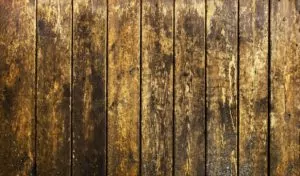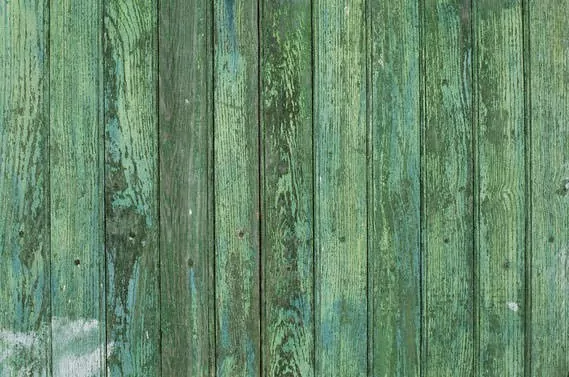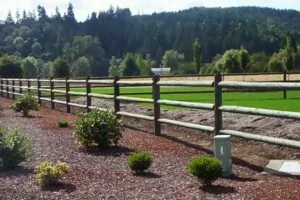Updated: August 2019
Cleaning A Wooden Fence
Dreaming of a clean wood fence? Then we need to talk a bit about the climate.
Seasons come and seasons go. But in the Pacific Northwest, it’s sometimes hard to tell. With the exception of summer, which seems to arrive fully formed each year on July 5, the other three seasons tend to blend into each other.
Rainy fall turns to rainy winter turns to rainy spring, and so on and so forth forever and ever and ever …
In fact, when it comes to temperature and precipitation, there’s sometimes no big difference between January 21 and April 21 — or November 21, for that matter.
But your wood fence knows. And you know — by looking at your wood fence. Chances are it’s weathered its share of PNW storms and months of relentless wet. So now that summer comes strolling along (on July 5, remember), it’s a swell time to get outside and clean the muck and dirt and grime and moss and to remove mold and algae from that wooden beauty.
Haven’t cleaned your wooden fence in many, many (far too many) seasons? Then you’ve got to deal with grime plus time, which equals an even bigger challenge. Most fence cleaners would turn to the usually sensible answer of eliminating the build-up with a high-pressure power washer.
But are there other ways? What are they? Can you clean a super dirty fence by hand using good ol’ fashioned elbow grease, a bristle brush, garden hose, chlorine bleach, and then letting standing back to let that fence dry? Good questions! (And you’ve come to the right place for some good answers.)
Moss, Mold, Mildew

Wooden fences tend to accumulate a good amount of mold and moss and should be cleaned regularly to prevent unwanted build-up. It’s important to remember to use solutions that won’t harm plants and landscaping. Of course, all yards are different, so be sure to do your own research prior to employing these methods and test any surrounding plants for reactions to your solutions prior to using them throughout the yard.
The safest way to clean a wooden fence is using strictly water and a scrub brush or pressure washer. If you do decide to use a pressure washer, make sure not to use too high of a PSI or you might damage the wood. (Electric pressures washers tend to be less damaging than gas-operated washers, by the way.) Test the pressure washer on an inconspicuous spot on your fence to test for potential wood damage.
If water isn’t enough to remove the moss, try mixing a solution of one-half cup of vinegar per gallon of water. Apply this to the moss and let it sit for about 15 minutes. Then simply scrub and rinse off! Baking soda also works well.
Finally, if none of the above methods work, you can try a strong solution such as Simple Green. Again, you’ll want to test first on a hidden spot on your fence.
How To Clean A Wood Fence Without A Pressure Washer
https://www.youtube.com/watch?v=2uhBUuso_IA&feature=youtu.be
You’ll need many of the same items to clean a wood fence without a pressure washer. In addition, you’ll need to supply the power yourself using that good ol’ fashioned elbow grease that we mentioned earlier. In either case (with or without a pressure washer), you should follow the following steps.
Here’s a simple breakdown of the process:
- Cover the ground around the fence with plastic sheeting. This will protect your plants and lawn.
- Get your cleaning solution together. Ask your garden center what they recommend. There are plenty of store-bought commercial wood cleaners that will do the trick. If you plan on mixing up your own, try using one part household bleach for every two parts warm water. (This is in addition to the vinegar solution suggested above to rid your fence of moss.)
- Use a scrub brush and get to cleaning! If you do plan to use a pressure washer at some point in the process, it’s still a good idea to get the bulk of muck off the fence with an ordinary brush.
- Rinse the fence with a garden hose.
- Let it dry.
- After it’s good and dry (one of the reasons you’re doing this work in the summertime!), fix anything that looks damaged. Sand down rough areas, if necessary. You might also consider adding a new coat of waterproofing to your newly cleaned fence.
- Invite friends over for a backyard barbecue! (Optional — but invite us if you do!)
Contact Pacific Fence & Wire with any questions.





